Search
Showing 10 of 1702 results for the cuzzy rolly, latest
-
Applications open for group Prime Minister’s Scholarships to study in Asia and Latin America
Applications from groups, institutions or organisation who can meet the objectives of the scholarship are welcome. Last year, successful group applicants included marae, whānau Māori trusts, tertiary providers, non-profit organisations and more. Applications close on 23 April 2023.
ENZ’s General Manager Sector Services, Sahinde Pala, says the scholarships are a wonderful opportunity for New Zealanders to gain transformational education experiences in Asia and Latin America.
“We love how the scholarships allow New Zealanders from a wide range of backgrounds to continue to add a global aspect to their learning, and make meaningful, often lifelong connections with people from other countries and cultures.
Applicants are invited to think differently about what overseas learning opportunities could enrich the lives of learners or members of their community, and how they contribute to New Zealand more broadly.”
The Prime Minister’s Scholarships are funded by the New Zealand Government and administered by Education New Zealand Manapou ki te Ao to support New Zealanders on learning experiences in Asia and Latin America.
The Scholarships’ group programme offers a flexible way to organise learning experiences in Asia and Latin America. Groups apply for a certain number of people, minimum of three, and once a programme is awarded, the organiser will run their own process to select the members who make up the group based on guidelines provided by ENZ.
Scholarship awardees from the 2022 group round have engaged in a diverse range of programmes, including customised indigenous-to-indigenous cultural exchange, advancing their language skills, learning new fashion design skills, and more.
Participants in a group programme simply need to meet the same eligibility requirements as individuals, including being a New Zealand citizen or permanent resident at least 18 years old at the date of applying.
Since its launch in 2013, the Prime Minister’s Scholarship programme has seen nearly 3,000 recipients, which helps New Zealand continue to engage with key partners in Asia and Latin America.
Applications for student groups from wānanga, universities, Te Pūkenga, private training establishments, iwi and other organisations will be open from 8 March – 23 April 2022, with successful applicants advised in early June.
More information is available on ENZ's dedicated scholarship website here.
A list of successful applicants from the 2022 group scholarship round is available here.
ENDS
Media contact:
Sai Raje
Senior Communications Advisor
021 479 649
Scholarship queries: scholarships@enz.govt.nz
Education New Zealand (ENZ) is a New Zealand Government agency dedicated to international education. ENZ promotes New Zealand as a study destination globally and supports New Zealanders to broaden their horizons through international education experiences beyond our shores.
-
Around the world in five
Asia
Australian TNE looks to India as countries recognise qualifications
Australia and India have signed a qualifications recognition agreement, which comes after Deakin University's announcement of plans to open a campus in India. The recognition agreement is expected to support transnational education and allow students with Indian qualifications to pursue further education in Australia and vice versa.
North America
US educators concerned over new rules on 'third-party' relationships
International educators in the USA are concerned that new Department of Education guidance and oversight of third-party relationships could have negative impact on international student recruitment.
South America
These are the best universities in Latin America in 2023
Latin America and the Caribbean (LAC) has seen a record 140 universities from 12 countries ranked in the Times Higher Education (THE) university rankings 2023, with many of the top region’s universities situated in Brazil.
Europe
New poll reveals public support for international students in the UK
Results from a new poll show that the UK public is positive about the contribution that international students make to the economy, institutions and academic research.
Africa
Visa crisis is jeopardising internationalisation efforts
South African universities face challenges in their internationalisation efforts due to a visa crisis that is affecting international students and staff.
-
March update from Immigration New Zealand
Update on Student visa processing*
Since New Zealand’s international borders reopened in August 2022, Immigration New Zealand (INZ) has received 29,228 student visa applications from international students outside of New Zealand. We have completed 24,549 of these applications.
Our recent processing times for international student visa applications are published on our website. These are updated each month: Visa processing times for international students | Immigration New Zealand
*Figures current as at 10pm on 6 March 2023.
Impact of Cyclone Gabrielle on international students
We are aware that some education providers' campuses have been damaged by Cyclone Gabrielle and have been forced to close temporarily.
This affects students’ immigration status because their current student visa requires them to attend the place of study specified on the visa which may not be currently possible. We understand that this is a difficult time, and we would like to help. An information sheet has been developed for affected international students and can be found here.
Approval in Principle timeframe
We have shortened the standard length of time we allow most offshore students to provide a tuition fee receipt (or other financial evidence) from ten to five working days to encourage students to complete the final steps of their student visa application quickly. We understand that some students may not be able to provide evidence in the timeframe they are given due to their individual circumstances. Extensions to this timeframe are available – the student or agent just needs to upload a brief letter explaining how much longer they will require and why.
Tuition fees
We would like to remind you that changes to the requirements for tuition fee payment evidence for students were introduced last year as part of the Immigration Rebalance.
Students need to pay tuition fees for the first year, or first programme of study (whichever is the shorter), and they will have to prove personal/maintenance funds for the same period. We do not accept payment of tuition fees by instalment; the only exception is for some aviation students.
Agent declaration
If you are providing advice or assistance with a student visa application - DECLARE yourself in the application. Education agents outside New Zealand are permitted to give immigration advice on student visas but must declare themselves in the application. We are seeing increasing numbers of agents not declaring themselves and these applications may take longer to process as a result.
INZ is intending to resume reporting on agent visa approval rates later this year, probably in September/October. If you are not declaring your involvement in an application, this will have an impact on your publicly available performance information. Education providers in New Zealand will be encouraged to check the agent performance report.
-
Second round of German academic exchange funding programme launching in April
ENZ and the German Academic Exchange Service (DAAD) will launch the second round of the German academic exchange funding programme on 5 April after the programme’s successful first round.
Funding will be available to researchers at higher education institutions in Germany and New Zealand. ENZ will fund early-career academics from New Zealand universities and Te Pūkenga – New Zealand Institute of Skills and Technology to travel to Germany, specifically students who are close to completing their PhD and academics who completed their PhD in the last five years.
With the objective of growing the number of applications in 2023, ENZ has decided to move to a model of providing funding up to NZ$12,500 per year for up to two years, without the need for applicants to show any other sources of funding.
The German academic exchange programme is the result of the signing of a Programmes for Project-Related Personal Exchange (PPP) arrangement between ENZ and DAAD in November 2021 to strengthen academic relations between New Zealand and Germany and promote complementary research activities.
ENZ’s Market Development Manager – Europe, Adina Stoye, said the programme had done much to grow academic collaboration between New Zealand and Germany through the partnership with DAAD, which is the world’s largest funding organisation for the international exchange of students and researchers.
“We are pleased with the success of the first round of the programme and are looking forward to seeing more applications for the second round launching in April.
“As an incentive to encourage more participation, applicants are no longer required to show any other sources of funding,” Stoye said.
Ahead of the programme’s launch, ENZ has organised an online information session on Tuesday 4 April at 7pm NZT (9 am CEST).
For more information on New Zealand German academic exchange programme and to apply, please visit this link.
You can register to take part in the information session on 4 April here.
If you have any questions, please contact ENZ’s Market Development Manager – Europe, Adina Stoye on adina.stoye@enz.govt.nz.
-
International study experience in Brazil excites scholarship recipients
A group of 15 students from the universities of Auckland and Waikato have recently returned to New Zealand after a month’s study in Brazil focusing on history and rights of indigenous people.
The students are group recipients of the Prime Minister’s Scholarship for Latin America, which promotes international study opportunities for New Zealanders.
The group’s itinerary included lectures and field trips around Brazil, including Brasília, São Paulo, the largest city in the southern hemisphere; and Ubatuba, a beautiful, coastal city that joins the Atlantic Forest to the ocean.
Students had the opportunity to meet local indigenous communities such as the Guarani and share their experiences and stories of Aotearoa New Zealand. They discovered the challenges and difficulties faced by indigenous people in Brazil, as well as the richness of their ways of life, music and handicrafts, as well as their connection to their spiritual world.
One of the highlights for the students was their visit to the recently opened Museum of Indigenous Cultures in São Paulo, which offered them a glimpse of the contemporary expression of Brazilian indigenous art, with diverse manifestations such as photography, hip-hop and art installations with social protest.
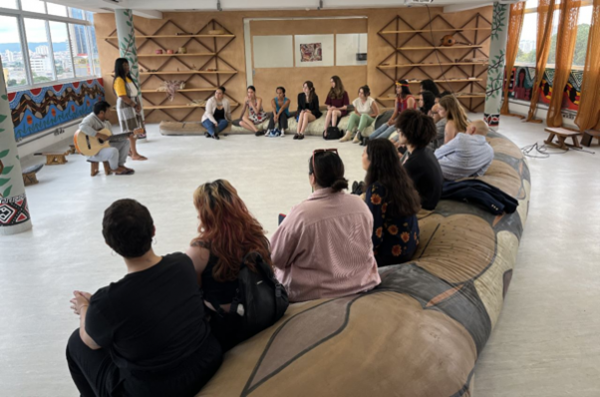
Members of the Museum of Indigenous Cultures perform a traditional song for visiting students from New Zealand.
The ENZ team in Brazil closely followed the journey of the scholarship recipients across the country.
ENZ’s Senior Market Development Manager – Brazil, Bruna de Natale said the students’ visit was a wonderful opportunity that has further grown the rich, cultural, and academic connections between Brazil and New Zealand.
“We were pleased to see how deeply the students immersed themselves in learning about history and indigenous rights in Brazil and make connections with indigenous communities in the country. It’s amazing to see the Prime Minister’s Scholarships for Latin America enable this rich exchange of ideas and knowledge between New Zealand and Brazil,” de Natale said.
The four-week visit ended in Brasília, where the students synthesised their learning in Brazil by presenting original projects that promote the connection between the indigenous cultures of Brazil and Aotearoa New Zealand.
The students’ insights are also captured on video that can be viewed here on LinkedIn.
-
Growing New Zealand’s education connections in the Middle East
ENZ participated in the re-opening ceremony and stressed the importance of education connections between New Zealand and Saudi Arabia to a 300-strong audience.
A rousing performance of ENZ’s waiata – Manapou ki te Ao – by Ngāti Koraha, a kapa haka group based in Dubai, supported the embassy’s re-opening ceremony.
The event took place in the same week that University of Otago alumna, Rayyanah Barnawi, made the news as she is set to be Saudi Arabia’s first woman astronaut in space when she travels to the International Space Station later this year.
The visit was a useful opportunity to engage on education with Saudi Arabian government officials and to discuss G2G opportunities with NZ Inc agencies in the wider Middle East region.
ENZ’s Senior Advisor for the Middle East, Bronwyn Shanks, said the visit has been valuable in the way it has helped ENZ to lay the groundwork for an education delegation to the Middle East, including Oman, the United Arab Emirates, and Saudi Arabia in May.
“We understand the significance of the Middle East region for our education sector, particularly Te Pūkenga, universities, English language schools and edtech companies.
“We’re building knowledge and connections on the ground that can help open doors for New Zealand education providers looking to grow their links in the region and look forward to supporting them with a high-level education delegation visit.”
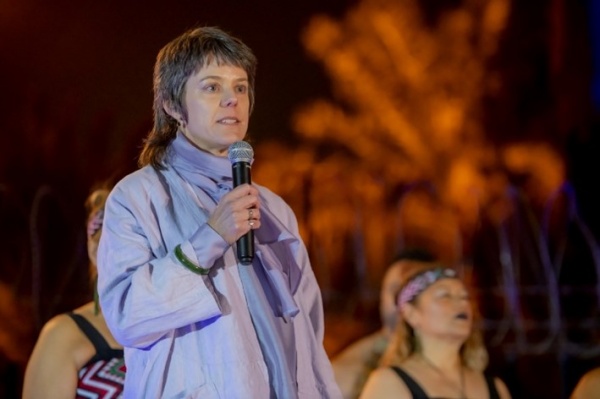
ENZ’s Bronwyn Shanks speaking at the New Zealand Embassy re-opening event, with Ngāti Koraha kapa haka group in support
Alongside the embassy’s re-opening event in Riyadh, ENZ and representatives from the University of Waikato and the University of Auckland met with Saudi government connections, including the National Institute for Educational Professional Development (NIEPD), Technical and Vocational Training Corporation (TVTC), Ministry of Culture, and Ministry of Tourism.
The discussions’ focus was on how New Zealand education providers could support Saudi Arabia’s efforts towards upskilling their young people under Vision 2030.
“It was great to meet some of those young alumni hosted by the University of Waikato and hear about the positive impact their New Zealand education experience continues to have now they are back in Saudi Arabia,” Shanks said.
ENZ and the University of Waikato also visited the University of Wollongong in Dubai, one of a network of study centres under university consortium NCUK, with which ENZ and all eight New Zealand universities have a partnership agreement to provide in-country foundation programmes.
Education providers interested in knowing more about education engagement in the region can contact ENZ’s Senior Advisor for the Middle East, Bronwyn Shanks, on bronwyn.shanks@enz.govt.nz.
-
Rebuilding New Zealand education’s visibility in China
Last month, Lillian spent three weeks in New Zealand in what was her first visit to the country as part of her role at Education New Zealand Manapou ki te Ao.
The two-pronged purpose of her trip was to provide refreshed marketing insights to education providers in New Zealand and hear from providers on their expectations and the challenges they face when marketing their offering in China.
Here are Lillian’s takeaways from her visits and interactions in New Zealand –
Need for storytelling that better highlights New Zealand education’s points of difference
- Engaging with education providers and visiting campuses highlighted to me several points of difference for New Zealand education, particularly how it is innovative, how it develops work-ready graduates, as well as how international students are welcomed and valued in New Zealand. Seeing these points of difference in real time made me realise how underrated the New Zealand education story is overseas, and the need to tell that story better. We need to focus on telling a New Zealand education story that is authentic and has concrete examples. A more visual storytelling format would be ideal to deliver the story.
- Tip: Demonstrate the teaching and student engagement practices your institution delivers using visuals (images or videos).
- Example: Take photos/videos in the lab, with robotics machines, with the 3D printer, the hands-on experience and student engagement (student hub), self-learning and learning from their peers.
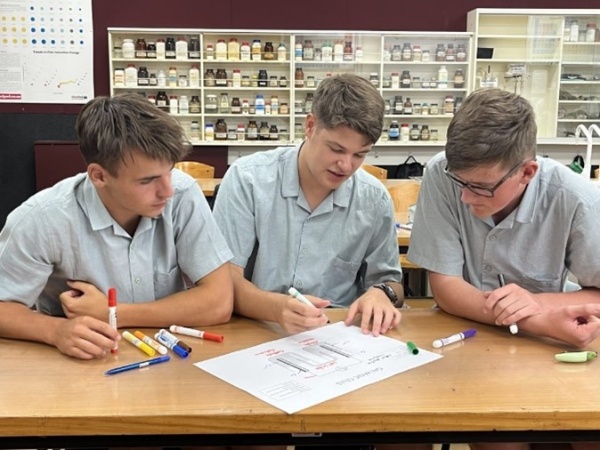
Visit to Middleton Grange Intermediate School to understand the differences between New Zealand and Chinese classrooms
Demonstrate outcomes of education programmes via successful alumni stories to promote offering
- Chinese parents and students are very outcome driven. Institution or programme rankings remain the key consideration, but other indicators and outcomes are becoming increasingly important, including employability, international recognition, and a life-changing experience.
Demonstrating the outcome of an education programme by leveraging successful student or alumni stories and testimonials can be a critical in activating ‘word-of-mouth’ promotion that influences the decision-making of prospective students and parents.
- Tip: Highlight successes or outcomes for students through stories. Degree + good experience = happy alumni story. Parents and students want to know if a qualification from a New Zealand institution will be recognised in China, the world or if it could be a pathway to further study.
- Example: A Chinese student studied a business degree with a New Zealand tertiary provider and then landed a job at a Fortune 500 company or became an industry leader. Or if a Chinese student studied virtual art in a New Zealand PTE, got a job in Weta Digital, which has worked on recent Chinese blockbuster films. We have seen Chinese media are very interested in interviewing and profiling such students in their publications.
Consider digital content in local language for marketing impact
- Research indicates that more Chinese students do their own research online and make their own decisions when choosing an overseas study destination and institution. So having a digital presence on China’s digital platforms is critical. Digital content in local languages also goes a long way in building brand awareness. If resources allow, exploring multiple channels and interacting with your audience in local languages will help you to gain a major advantage in optimising brand awareness and driving results in student recruitment.
- Tip: Host Chinese language and China specific channels such as an official WeChat account. We understand it isn’t easy to set one up. If you are unable to set up a WeChat account for any reason or don’t have Chinese-speaking staff, having a Chinese language website is the next best option. Having crucial information online in Chinese helps promote the institution as trustworthy. Parents and students will use the Chinese language website to confirm information, even if they rely heavily on agents or school counsellors.
- Example: ENZ has been working to optimise our digital presence in China, including with our Chinese language website: studywithnewzealand.cn. We recently revamped the storefront of SWNZ.cn to bolster its localisation, ensuring that from a Chinese user point of view, we can keep them interested and engaged in considering a New Zealand education provider. To ensure our digital presence continues to be fit for purpose, we undertake regular work to update and troubleshoot our platform and content.
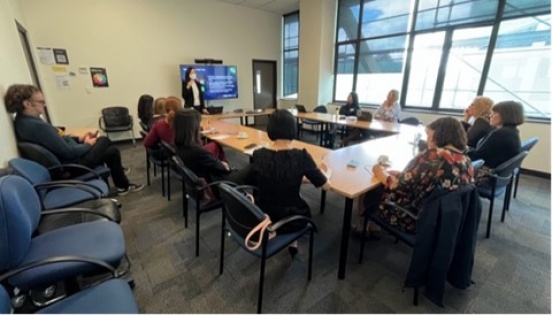
ENZ’s Lillian Zhang presents China Marketing Insights and Strategies session to members of Study Dunedin on 24 February
With China fully re-opening to the world in January, the tempo of in-person events in the country is at pace already.
ENZ’s Greater China team is looking forward to supporting New Zealand providers visiting the country for agent seminars in Guangzhou and Beijing in May and other events later in the year.
If you have any enquiries related to marketing in China, please contact: china@enz.govt.nz
- Engaging with education providers and visiting campuses highlighted to me several points of difference for New Zealand education, particularly how it is innovative, how it develops work-ready graduates, as well as how international students are welcomed and valued in New Zealand. Seeing these points of difference in real time made me realise how underrated the New Zealand education story is overseas, and the need to tell that story better. We need to focus on telling a New Zealand education story that is authentic and has concrete examples. A more visual storytelling format would be ideal to deliver the story.
-
International students welcomed across New Zealand
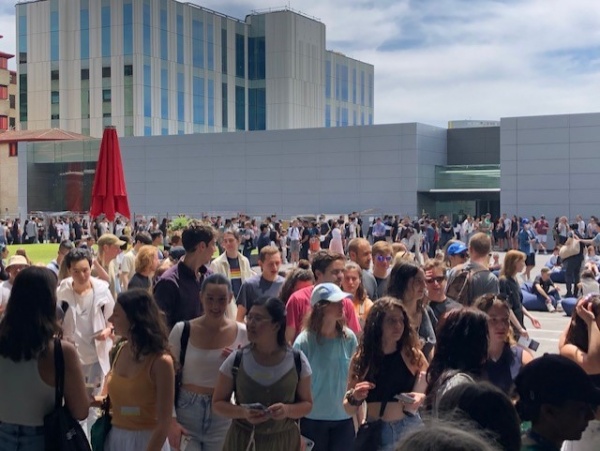
In February, hundreds of international students gathered at a University of Auckland orientation event. ENZ’s Student Experience Manager, Ross Crosson, says, “The wait, for many, has been long but there was a very positive vibe in the air.”
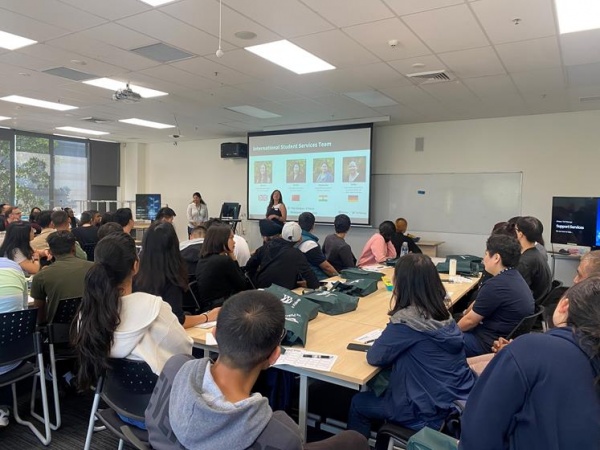
In Hamilton, the Wintec | Te Pūkenga International student services team held an interactive event to welcome students on campus. They used a range of activities to create connections amongst the students and to familiarise them with student support services available.
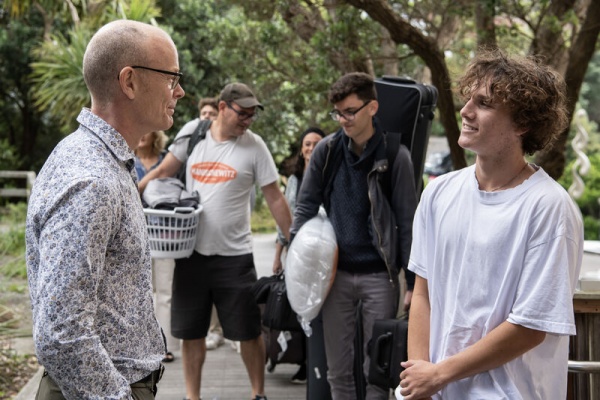
Over in Wellington, Victoria University of Wellington Vice Chancellor Nic Smith took the opportunity to connect with students face-to-face as they were settling into halls of residence.
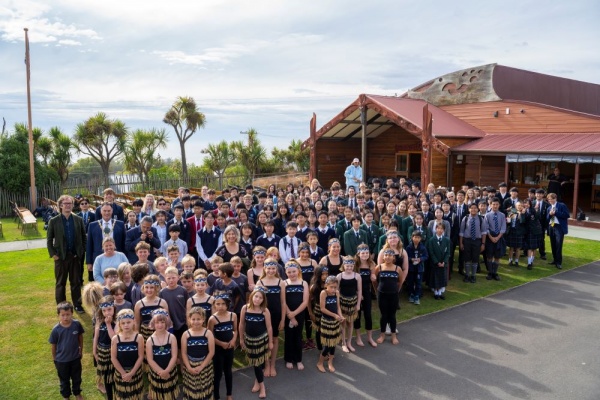
More than 150 international students from 11 local secondary schools were welcomed into Dunedin at Puketeraki Marae on 8 March. In the event organised by Enterprise Dunedin and Kāti Huirapa Rūnaka ki Puketeraki, the guests spent the morning at the pōwhiri, which was accompanied by pupils from Waitati School kapa haka group, and then enjoyed a kōrero and some kai.
-
Education New Zealand Manapou ki te Ao welcomes new Board Chair
The Minister of Education, Jan Tinetti, confirmed two new appointments to the Board of Education New Zealand Manapou ki te Ao on 17 March.
Tracey Bridges has been appointed Chair for a three-year term from 1 April 2023. She succeeds Steve Maharey who will finish his term at the end of this month.
Read the Minister’s announcement here.
In addition, two existing Board members have been reappointed. Dr Linda Sissons for a third term until 15 March 2024 and Daniel Wilson to a three-year term.
Tracey Bridges has knowledge of regional economic development, and expertise in strategy, risk, and reputation management, and in social marketing. She is Chair of the Wellington Regional Economic Development Agency Limited (WellingtonNZ), co-founder of The Good Registry and sets on the Boards of Sky Stadium, Whānau Āwhina Plunket, the Wellfed NZ Trust and the Digital Media Trust.
Dr Dona (Therese) Arseneau has been appointed as a member for a three-year term from 1 April 2023. Dr Arseneau also has knowledge of economic development including international education’s contribution to regional economic development, and governance experience in the tertiary sector at the Ara Institute and the Open Polytechnic. She previously chaired Regenerate Christchurch and Enterprise North Canterbury.
-
From the CE: New Zealand education promotion continues at pace
I can assure you I have never seen as much interest in New Zealand as an education destination. Despite the challenges we’re all aware of and the activities of our competitor countries, the New Zealand education offering remains attractive. We all must continue to tell the New Zealand education story.
On Friday 17 March, Minister of Education Jan Tinetti announced new appointments to our Board. I want to acknowledge outgoing Board Chair, Steve Maharey, and welcome Tracey Bridges to the role. Steve has been a stalwart and tireless advocate for international education, both in the community and the corridors of power for over 30 years. In his time as our Chair, he has seen and contributed to enormous change within the sector and ENZ. Personally, I have appreciated his deep understanding, straight talking and clear direction.
Tracey Bridges has knowledge of regional economic development, expertise in strategy, risk and reputation management, and in social marketing. She is Chair of the Wellington Economic Development Agency Limited (WellingtonNZ), co-founder of The Good Registry and sits on the Boards of Sky Stadium, Whānau Āwhina Plunket, the Wellfed NZ Trust and the Digital Media Trust.
Tracey is joined by Dr Therese Arseneau. Dr Arseneau also has knowledge of economic development including international education’s contribution to regional economic development, and governance experience in the tertiary sector at the Ara Institute and the Open Polytechnic. She previously chaired Regenerate Christchurch and Enterprise North Canterbury.
We all know that the contribution of international education is far broader than just the direct and immediate economic impact of the students that come to New Zealand. For the first time, ENZ along with EY have sought to quantify the extent and the value of these wider benefits.
Research commissioned by ENZ that will be released before the end of March found that international education is not only a significant contributor to the New Zealand economy but also that international students living and working in the country bring in a raft of social, cultural, and international benefits. It goes on to explore the extent of the indirect longer-term contribution to New Zealand’s GDP from the small proportion of international students that remain in New Zealand on completion of their studies. The research also quantifies the impact of the pandemic.
Look out for the formal release and when it is available I urge you to download the report from Intellilab.
To complete your international education-related reading list, our Briefing to the Incoming Minister, Minister Tinetti is now available here on the ENZ website. The BIM, as it is known, is prepared when new Ministers are appointed to portfolios.
He maurea kai whiria! – Ignore small matters and direct effort toward important projects!
Ngā mihi nui,
Grant McPherson

